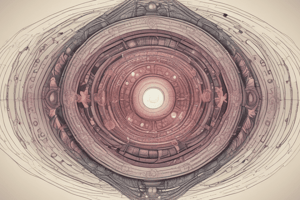Podcast
Questions and Answers
What is the effect of a mutation on a somatic (body) gene?
What is the effect of a mutation on a somatic (body) gene?
- It will be passed on to the offspring
- It alters the DNA letter sequences in the genes
- It only injures the individual (correct)
- It weakens the organism
What do mutations generally produce within genes or chromosomes?
What do mutations generally produce within genes or chromosomes?
- Gross changes in chromosomes
- An alteration of DNA letter sequences in the genes
- An increase in genetic diversity
- Changes in chromosomes leads to change in genetic information (correct)
What did Hugo de Vries mistakenly think he had discovered?
What did Hugo de Vries mistakenly think he had discovered?
- A new variety (sub-species) of the primrose
- A new chromosome sequence
- A new species (correct)
- A new kind of plant or animal
What is the correlation between the development of the human embryo and other vertebrates?
What is the correlation between the development of the human embryo and other vertebrates?
What does the similarity in embryos of different species reveal?
What does the similarity in embryos of different species reveal?
Flashcards are hidden until you start studying
Study Notes
Effects of Mutations on Somatic Genes
- A mutation on a somatic (body) gene affects only the individual cell or tissue where the mutation occurred, and is not passed on to the next generation.
Consequences of Mutations
- Mutations generally produce abnormal or altered proteins, which can disrupt normal cellular function, leading to disease or abnormalities.
Hugo de Vries' Mistake
- Hugo de Vries mistakenly thought he had discovered the concept of "mutation" as a sudden, drastic change in a species, which he believed was the driving force behind evolution.
Embryonic Development
Correlation between Human and Vertebrate Embryos
- The development of the human embryo shows a strong correlation with the development of other vertebrates (animals with backbones), such as chickens, frogs, and fish, with similar embryonic stages and structures.
Similarity in Embryos of Different Species
- The similarity in embryos of different species reveals a common ancestry and shared evolutionary history, as these similarities are not present in adult forms of the same species.
Studying That Suits You
Use AI to generate personalized quizzes and flashcards to suit your learning preferences.




